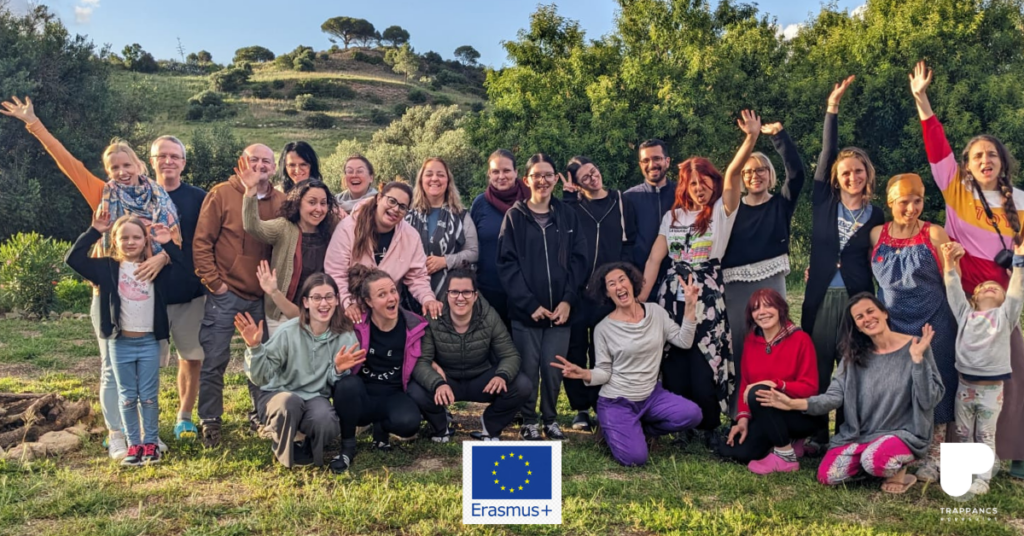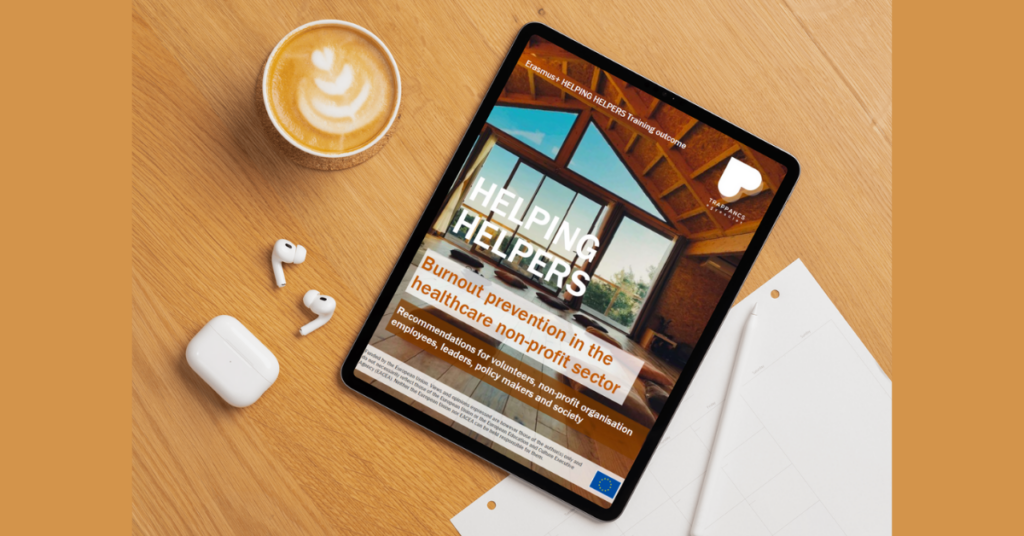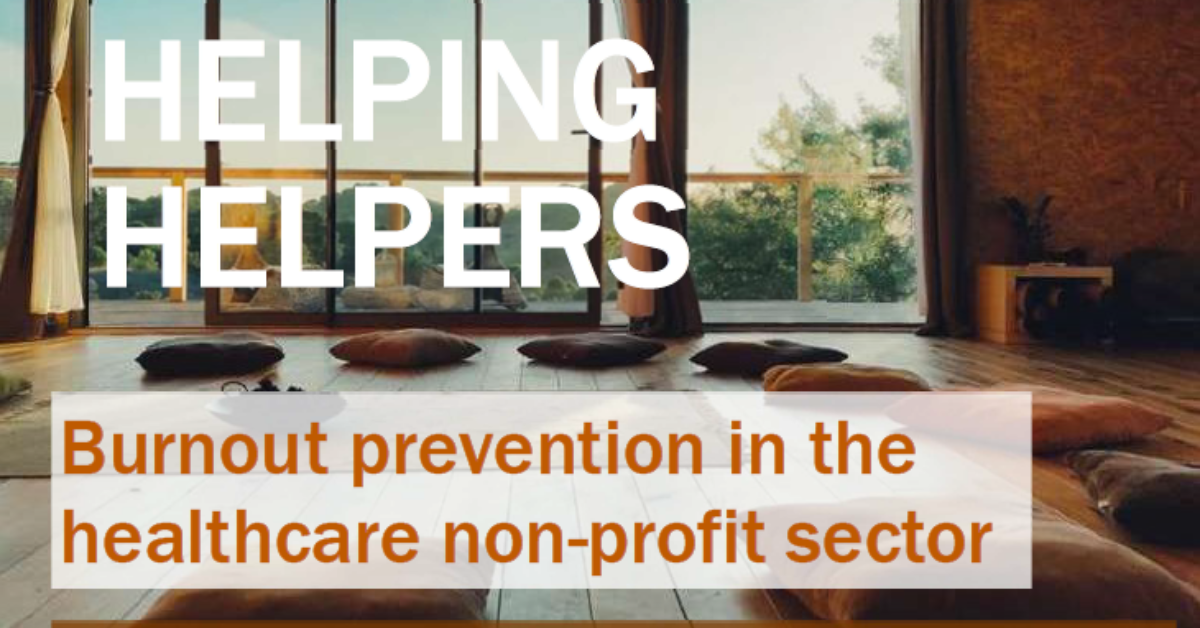Recommendations for volunteers, non-profit organisation employees, leaders, policy makers and society
Funded by the European Union. The views and opinions expressed are those of the author(s), and they do not necessarily reflect those of the EU or EACEA. So, neither the EU nor EACEA can be held responsible.
About Helping Helpers
The Helping Helpers training was an 8-day Erasmus+ funded training program held in rural Portugal, bringing together employees and volunteers from healthcare-related non-profit organisations around Europe. These individuals, often patients or caregivers themselves, face high risks of burnout due to emotional and physical demandsof their work. The training aimed to address these challenges by providing evidence-based stress management and communication tools through the Williams LifeSkills training, peer support, and self-reflective workshops.
The training was organized by Trappancs Association partnering non-profits fromBelgium, Cyprus, Estonia, Portugal, Hungary, Greece, the Netherlands, Slovakia and Slovenia.
About Trappancs
Trappancs Association for the Rehabilitation and Sport of Organ-Transplanted Children has been dedicated to supporting teenagers and young adults before and after life-saving organ transplants since its founding in 2007.
The organization focuses on both psychosocial and physical rehabilitation, helping young patients regain confidence, independence, and an active lifestyle.
„We need to start taking better care of non-profit employees, volunteers, and advocates. After all, they work with and for chronically ill and disabled youth. In many cases, they dedicate themselves fully to young patients. As a result, they often neglect their own well-being.„
Why does this report matter
Non-profit employees and volunteers working in the healthcare sector play a vital role in supporting chronically ill and disabled people. However, many face overwhelming workloads, emotional strain, and resource shortages, putting them at high risk of burnout. When these dedicated individuals reach their limits, the entire system suffers—impacting the quality of care and support available to those who need it most.
This report compiles practical, experience-based recommendations to help prevent burnout at individual, organizational, and policy levels. By addressing systemic challenges and providing actionable solutions, it serves as a roadmap for creating healthier, more sustainable non-profit environments.
How were the recommendations created?
The recommendations presented in this report were developed by participants of the Helping Helpers training, who identified barriers to work-life balance for non-profit workers and volunteers in healthcare organisations. After prioritising these barriers, they collaboratively created solutions for the most pressing issues at individual, organisational, and policy levels.
Who can benefit from this report?
The recommendations address the following stakeholder groups:
- Volunteers
- Employees of healthcare non-profits
- Leaders of healthcare non-profits
- Policymakers
- Anyone from the general society
We hope these recommendations can also be useful for non-profits in other sectors. Keep in mind, they are not set in stone or final; they’re meant to spark important conversations in our communities, online and offline.

Recommendations to volunteers
1. Be strict with the time you spend volunteering (per week/ month) – Set clear limits on how much time you dedicate to volunteering to avoid overworking yourself.
2. Create realistic goals – Set achievable volunteer objectives and communicate them openly to prevent frustration and ensure sustainable engagement.
3. Balance volunteering with personal time to avoid burnout – Make sure your volunteer work does not take over your personal life; prioritize rest and well-being.
4. Discuss and adjust your volunteer schedule with family – Keep open communication with loved ones to ensure volunteering does not negatively impact personal relationships.
5. Involve family in volunteer work (at least partially) – Whenever possible and comfortable, integrate those close to you into volunteer activities to strengthen support and time management.
6. Spend time on learning and practicing stress management skills – Utilize stress management techniques to handle the emotional demands of volunteer work (e.g. Williams LifeSkills training).
7. Help raise awareness on mental health and well-being – Break the taboo of prioritising yourself, practice setting and communicating boundaries clearly and showing a good example to others.
8. Never forget why you started volunteering – Regularly reflect on your motivation to stay engaged and inspired.
Recommendations for non-profit employees
1. Maintain clear boundaries between work and personal life by keeping work within office hours and ensuring family time remains undisturbed. Avoid bringing work “home” to prevent burnout and maintain a healthy balance.
2. Take care of your stress levels – Apply evidence-based stress management techniques to handle workplace challenges more effectively, including setting boundaries assertively, recognising negative automatic thoughts and experimenting with relaxing techniques that work for you (e.g. through Williams LifeSkills training).
3. Create realistic goals – Set achievable objectives to prevent overcommitment and frustration, ensuring a sustainable workload.
4. Balance your work and free time – Avoid burnout by prioritizing rest and recovery, making sure personal well-being is not sacrificed for work.
5. See the forest, not the tree – Maintain perspective by focusing on long-term impact rather than getting overwhelmed by daily struggles.
6. Working with patients and their families can be emotionally demanding, and it can be even harder if you or your family are also affected by chronic illness or disability. The emotional burden can be too much to carry alone, so it is essential to ask for psychological support or supervision when needed. After all, your well-being matters just as much.
Note: The recommendations for employees generally apply to leaders as well. The recommendations on the following page provide additional considerations specific to the roles and responsibilities of leaders.
Recommendations for non-profit leaders
To ensure clarity and consistency, develop policies that guide the organization’s operations. As a result, these policies should set clear boundaries and expectations for both staff and volunteers.
2. Engage all stakeholders in a collaborative approach to endorse policies that reflect the needs and well-being of staff and volunteers. Ensure these policies align with the organization’s mission.
3. Engage all stakeholders in a collaborative approach to develop and endorse policies that reflect the needs and well-being of staff and volunteers. Ensure that these policies are aligned with the organization’s mission.
4. Endorse electing board members who are aligned with the vision and mission of the organization, ensuring shared understanding and long-term success.
5. Show appreciation to employees, volunteers, and partners through small gestures like offering bonus days off or providing thoughtful benefits, such as a free lunch, to acknowledge their dedication.
6. Encourage individuals to see the bigger picture, helping staff and volunteers understand the broader impact of their work beyond day-to-day tasks.
7. Ensure clear responsibilities and rules are in place, creating a structured environment with defined roles and expectations for everyone.
8. Maintain openness to change and adapt organizational processes and policies as needed to improve efficiency, morale, and overall success.
Note: The recommendations for employees (see page 5) generally apply to leaders as well. Those above provide additional considerations specific to the roles and responsibilities of leaders.
Recommendations for policymakers
1. Recognise non-profit organisations as strategic partners, allocating appropriate funding and resources to support their vital work in healthcare and social services.
2. Invite diverse voices from within the healthcare sector, including NGOs, patients, caregivers and health professionals, to influence policy decisions and bring a variety of perspectives into the process.
3. Develop and communicate a long-term vision for the non-profit sector in healthcare, ensuring that policies are designed for sustainability and long-term impact.
4. Ensure continuity in decision-making, advocating for long-term stability in the healthcare non-profit sector avoiding sudden shifts that can disrupt progress.
5. Collaborate with countries that have successful funding and support models for healthcare non-profits,learning from their best practices and sharing knowledge to improve local healthcare systems.
6. Endorse and implement policies that promote healthy working environments for non-profit and healthcare workers, prioritizing their well-being and reducing burnout.
Recommendations for society
1. Advocate for healthcare advancements by getting involved in efforts to secure better funding, accessibility, and inclusion, and using your voice to push for meaningful change.
2. Raise public awareness by participating in or organizing events, campaigns, or workshops that highlight the challenges faced by healthcare workers, patients, and caregivers, encouraging action.
3. Volunteer and collaborate with non-profits by dedicating your time, donating resources, or supporting their campaigns through personal networks and social media to help make a difference in healthcare.
4. Engage in health education by learning about key healthcare issues, policies, and ways individuals can contribute, equipping yourself to join meaningful conversations and solutions.
5. Support decision-makers who prioritize health and inclusion by voting for politicians and policies that focus on healthcare reform, sustainable non-profits, and the well-being of patients and healthcare workers.
Project partners who reviewed and endorsed the recommendations

Investing in the well-being of those who help others is not just important. In fact, it is absolutely essential. Without this kind of support, nonprofit organizations working with patients may struggle to remain effective. As a result, their long-term impact could be at risk.
BE THE CHANGE
Start the conversation in your own community today!
If this message resonates with you, share it and help us spread the word.


